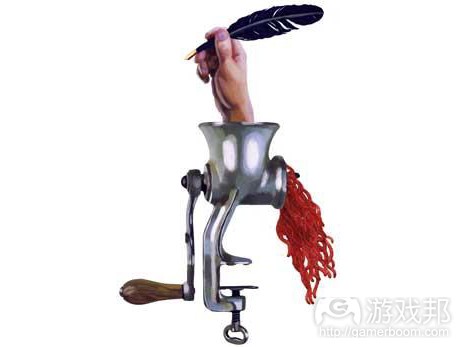打造优秀故事媒介 作家与设计师责无旁贷
作者:Leigh Alexander
多年来我一直在参加于奥斯汀举行的Game Developers Conference Online大会,我们可以在此与那些一年都难得见到几次面的好友和同行们相聚,并且更轻松地吸收各种有帮助的谈话内容和发展趋势。
同时,GDC Online还发起了Game Narrative Summit(游戏叙述峰会),我喜欢参加这种会议因为我能够从中了解到这些专业人士切身经历过的各种挑战。
听到电子游戏被誉为21世纪最优秀的故事媒介,这是我们梦魅以求的目标,是玩家和游戏开发者多年翘首期盼的结果,这当然有可能成真。我们一直坚信游戏能够取得好的发展,要不我们也不会一直坚守与此了。
我们之所以选择游戏是因为对此难以言表的热爱,以及早前游戏所带给我们的记忆。尽管这些记忆夹杂着各种设计问题,原始的用户界面以及不断扩展更广泛的用户等内容,但是我们始终相信这些问题最终都能够得到解决,带着这种信仰我们将所有精力投入游戏中,并始终致力于创造真正优秀的游戏。尽管现在的游戏还未能实现这一目标,但是在未来的某一天,它一定能够做到!
如今,游戏作家身上的担子越来越重了。硬件设备为技术和设计发展创造了更广泛的空间;游戏变得越来越完善了,开发者也为此制定了一系列准则。可以说我们现在正处于高度发展时期,而我们也进一步明确了我们所创造的游戏框架细节。而如果现在社会仍然不能“接受”电子游戏,用户仍然不满各种陈旧的游戏玩法,游戏对话中仍充斥着各种笨拙且具有性别歧视的内容,那一定是游戏作家的错吧。大师级的游戏玩法却匹配一个无聊的故事?都怪游戏作家!
有趣的是:参加游戏叙述峰会我们便能够遇到一些真正在意游戏故事的人士。我所遇到过的作家们大多不善于社交,自闭,甚至习惯于被误解与被忽视——但是他们从小时候就一直期盼着能够看到游戏作为一种讲故事形式而得到认可。可以说他们身上散发出一种矛盾的激情与无能,他们似乎在高喊:“我们深切地关注着某个内容,但是推动着我们去实现这一目标的工具却是无效的,死板的。”
作家很容易立即表明他们对于设计权威性的认可与尊重。致力于游戏领域的作家们从入行的第一天就需要学会如何去尊重这种权威性。设计师能够在此自由地发挥自己的才能,而随后作家应该围绕着设计师的理念并在其框架下进行创作。似乎有一种声音反复回荡于作家心中,提醒着他们不要去碰触自己没有权利碰触的东西。很多人都清楚设计师与作家之间存在的一种古怪的僵局,但是却不存在一种完整且有效的方法能够解决这一问题。虽然大家都知道他们最好能够和谐相处并合作,但是事实却往往不是如此。
今年的GDC Online吸引了更广泛的参与者,在此我们也见识到了各类游戏以及当前人们每天所接触到的社交媒体游戏机制。几乎所有人都在玩游戏,并且来自发达世界的人们几乎都是网络用户,因此可以说在线游戏已经完全战胜了电子游戏。但是障碍却仍然存在着。
游戏叙述峰会迎来了无数创意人员,他们真心希望能够利用当前稳定的掌机平台环境以及全新且强大的在线平台而取得更进一步的发展。还有其它会议也为这些创意人员提供各种提高用户粘性的策略,社区管理方法,盈利策略以及任何帮助他们更好地整合游戏故事的手段。
如果我们不能向世人解释游戏为何会是一种“优秀的故事媒介”,我们就必须加快整合设计师与作家之间的合作。因为这两方都在有效地发挥自己的作用,如果他们不能有效地结合在一起,那么我们一切的努力都会白费。
(本文为游戏邦/gamerboom.com编译,拒绝任何不保留版权的转载,如需转载请联系:游戏邦)
Opinion: Written out
Author: Leigh Alexander
I’ve been attending the Game Developers Conference Online in Austin for a number of years now. It’s possibly my favourite game industry event for a number of reasons: all the happy reunions and hobnobbing of the main GDC but on a less gruelling schedule (as in, I actually have time to eat meals!), more time for conversation with the friends and colleagues I only see a few times a year, more space to digest the talks and trends. Plus, they have some fine bars in Austin, let me tell you.
GDC Online is also home to the Game Narrative Summit, which brings some of my favourite folks in the industry into one room for a few days of thoughtful presentations and dialogue on writing in games. I like the writers not just because they’re friendly and make interesting conversation – nor because I was also invited to present last year – but because I respect the enormity of the challenges they face in their work.
It has, of course, been decreed that videogames are to be the 21st century’s ?Great Storytelling Medium. This is our oft-brandished goal, and while a lot of that mandate is wrapped up in the ache for legitimacy and respect that gamers and game developers have felt for years, it’s certainly plausible. We all believe that games are On To Something, or else we wouldn’t be here.
We came because of a deep yet hard-to-define love, because of our memories of the times games moved us, the places they took us and with whom. And though those stirring moments are obfuscated amid our knowledge of great big design problems, primitive user interfaces and the ever-present urge to reach a wider audience, most of us harbour the belief that one day all of those problems will be resolved, that the sense of promise that led us to devote our lives to games will flourish. Games aren’t “there yet”, people say, but they will be, at some point in the future, once we figure all this stuff out.
It’s to game writers that this cumbersome mantle ultimately falls, now more than ever. The long hardware cycle has created ?a glorious plateau where there’s leisure to explore subtle evolutions in tech and design. Games look perfect. Developers have nailed the formula. This is our High Classical period, and we are carving subtle details into architectures we have mastered. If society still doesn’t ‘get’ videogames, if audiences are still frustrated with a holiday season full of war clichés, if dialogue is still clunky and sexist, it must be the fault of writers. Masterful gameplay with dumb story? Blame the writers.
Here’s the funny thing: attend the Game Narrative Summit and you’ll meet people who care deeply about storytelling. They would probably take issue with generic bombshells who have their bodysuits unzipped to their hips, with legions of fist-bumping marines, with obtuse dragon-explicating lorebooks and insular spaceship topographies. They attend events with the firm commitment of people who understand it’s their mandate to buck clichés.
The writers I’ve met possess a similar breed of retiring shyness, of self-diminishment, peculiar to those who are accustomed to feeling misunderstood and irrelevant – the mien that those who’ve grown since childhood eager to see games ascend to the storytelling throne would immediately identify and recognise. They share the same odd coupling of passion and impotence, as if to shout: ‘There is something we care a lot about, and the machinery that would lead us there is proving hostile and inflexible’.
Writers are quick to declare their respect for the primacy of design. All who’ve tried to work in the sphere that crafts narrative for games have been taught from day one to honour that primacy. Let the designers craft their brilliant machinery, let the writers comprehend it and work within its constraints. It’s like they’ve been told a thousand times that the adults’ table is not for them. The weird standoff between designers and writers is often declared, widely recognised, and yet potential solutions are half-acknowledged and poorly understood. Everyone knows they need to work better together, but it isn’t happening.
This year at GDC Online I saw much made of the widening audience, the perma-integration of games and game mechanics with the social media that many people use every day. All humans play, and now nearly all humans in the developed world are online, ?and thus it follows that ‘online’ is a frontier already won for videogames, there to be taken. And barriers still stand?
The Game Narrative Summit hosted brilliant creatives dearly hoping to use the opportunities in a stable console arena and a wild new online frontier alike to finally progress the agenda. Other sessions held forth on engagement strategy, community management, monetisation tactics and everything but how to integrate storytelling.
It’s possible that our wish to see games become a ‘great storytelling medium’ is just a thing we say when our in-laws don’t understand why we bang our heads against electronic toys again and again. But if it’s not, the integration between writers and designers must accelerate. Because both parties have been doing their jobs so well that it would be a shame if they couldn’t do them together.(source:edge-online)








































 闽公网安备35020302001549号
闽公网安备35020302001549号